Make ICT Fair project

The University collaborated with ten partners across Europe on an EU-funded project entitled ‘Make ICT Fair – Reforming Manufacture and Minerals Supply Chains through Policy, Finance and Public Procurement’ from November 2017 to January 2021.
Project aim
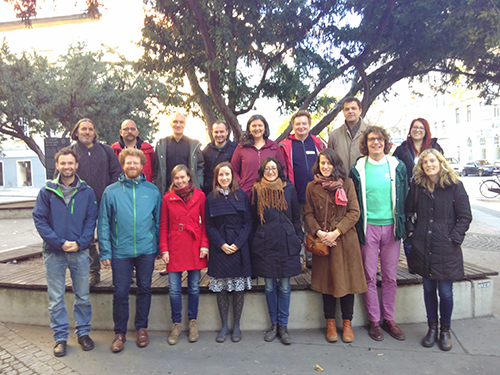
This project aimed to improve the lives of workers and those impacted along different stages of the ICT supply chain through research, campaigning, capacity building and advocacy. It built on the University’s affiliation to Electronics Watch, which carries out worker-based monitoring of Information and Communication Technology (ICT) factories on behalf of public sector members.
Make ICT Fair overview website
University of Edinburgh output: Human rights risks in the ICT supply chain
Project partners
- Swedwatch (Sweden)
- Suedwind (Austria)
- CATAPA (Belgium)
- CEE Bankwatch Network (Central and Eastern Europe)
- Electronics Watch (Europe-wide)
- People & Planet (UK)
- SETEM Catalunya (Catalunya)
- Le Monde Diplomatic (Poland)
- ICLEI (Europe-wide)
- Towards Sustainability Association (Hungary)
- The University of Edinburgh (UK)
Research
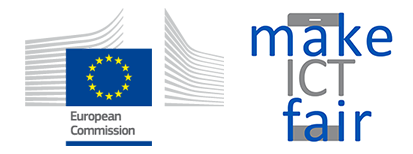
The School of Social Political Science, in collaboration with the Department for Social Responsibility and Sustainability, carried out research on labour, community, environmental and legal issues in electronics manufacturing, and collaborated with Swedwatch, CATAPA and CEE Bankwatch Network who researched similar issues in mining. The team is worked to map ICT supply chains, carry out field research in sites of mining and manufacture, and develop recommendation reports and policy briefings, as well as academic papers.
Disclaimer: This project is organised with the financial assistance of the European Union. The contents of this web page is the sole responsibility of the University of Edinburgh and can under no circumstances be regarded as reflecting the position of the European Union.
Some of the research reports shared on this website have been produced by the University of Edinburgh’s partners on the EU-funded Make ICT Fair project. These reports do not reflect the views of the University of Edinburgh, and any queries regarding their content should be addressed to the authors identified within each report.
Human rights risks in the ICT supply chain
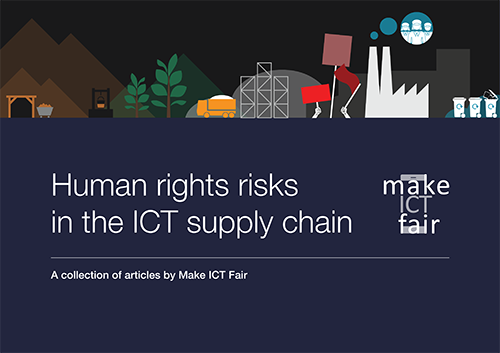 A collection of articles by Make ICT Fair, published 2021.
A collection of articles by Make ICT Fair, published 2021.
This collection of articles brings together mapping, research and advocacy activities that took place as part of Make ICT Fair, an EU-funded project that aims to improve the lives of workers and those impacted along the various stages of the ICT supply chain. The project includes research, campaigning, capacity building and advocacy. Several risk-assessment and fact-finding missions into ICT supply chains have thus far been organised. This document provides only a short synopsis; the more detailed reports of the fact-finding missions are available via the links in figure 1 or will be published in the near future.
Green technologies for people and planet
An article from CATAPA and War on Want, published January 2021.
Climate justice, supply chains and mining-industry’s destruction of communities and eco-systems in Chile, and around the world.
We are witnessing a revamped drive for a green economy. The transition towards an energy system powered by 100% renewable sources, and the so-called ‘4th industrial revolution’ of computer technology, big data and artificial intelligence, are being turbocharged by the prospect of multiple green industrial revolutions set to ‘kick-start’ the global economy as a response to the economic turmoil unleashed by the pandemic.
However, the logic and narrative of ‘green economy 2.0’ may not help us to deal with the ecological crisis. In fact, if uneven, market-driven renewable energy production and distribution, carbon capture and storage, and geoengineering continue to be accepted as viable solutions, humanity’s existential crisis could get a whole lot worse.
Circular fair smartphones – Joint Statement of Demand
The statement is supported by ICLEI – Local Governments for Sustainability, Electronics Watch and the Procura+ European Sustainable Procurement Network, published in January 2021.
As major consumers of smartphones, ICLEI members and Procura+ participants are challenging the market with a joint statement of demand outlining their vision towards fair and circular smartphones by 2025.
The statement comes as 9 points of actionable ambitions such as
- By 2025, we are tendering with harmonised criteria and clauses that push for fair and safe working conditions and environmental sustainability across the entire supply chain including raw materials extraction, manufacturing and delivery stages as well as at repairing, reuse, recycling and disposal stages of smartphones and its components
- By 2025 we are procuring 2nd-life devices, which meet all of our needs, in terms of quantity, quality, and security.
- By 2025 we can apply certification and worker-driven monitoring to contribute to circularity, environmental and social responsibility supported by regular dialogue for continuous improvement.
Hazardous chemicals in ICT manufacturing and the impacts on female workers in the Philippines
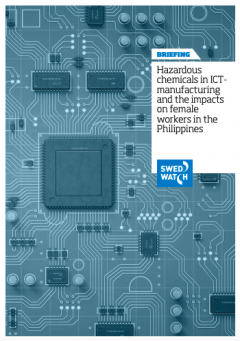 A Swedwatch investigation, published in January 2021, supported by Make ICT Fair.
A Swedwatch investigation, published in January 2021, supported by Make ICT Fair.
Electronics brands must protect workers from hazardous chemicals in the Philippines
Results from a new Swedwatch survey indicate shortcomings in the human rights processes of leading smartphone and laptop brands sourcing from the Philippines. The mostly female factory workers risk severe health risks from exposure to hazardous chemicals and many fear dismissal if they speak out. Despite the Philippines being ranked among the world’s worst countries for workers’ rights, the brands fail to demonstrate adequate awareness of risks to workers’ health and safety.
Linking the Bolivian Minerals to the European Industry
Project partners were Make ICT Fair, CATAPA and Oblaten – Solidaridad Nación Uru (SNU). Published in November 2020.
Although indium might be a rare metal, it is not rare at all in your daily life. No smartphone can be produced without its use. Flatscreens, touchscreens, LED lights, photovoltaic panels and even the high efficiency glass of the windows in your house can contain this element.
Indium is a metal that has grown in importance since the 21st century. Lots of new technologies are based on its use, as it has the particular property of being transparent in thin coatings and still acting as an excellent conductor. The source of this raw material is not always easy to track. The indium market is very opaque.
[The report] is part of a fact-finding mission by the European Union project ‘Make ICT Fair’. It tries to reveal a considerable part of the supply chain of indium by starting its research in the very beginning of the chain: a few mining cooperatives on the Bolivian highlands extracting silver-lead-zinc polymetallic ore; and it traces the supply chain beyond, feeding the European industry.
Occupational poisoning in ICT manufacturing
Towards a fairer ICT supply chain
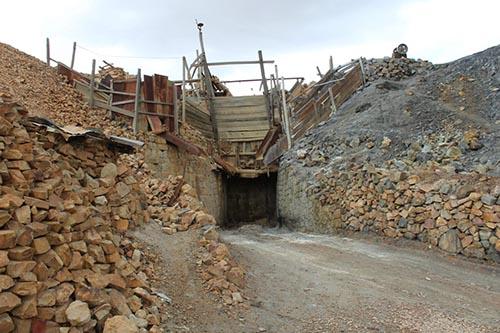 ‘CATAPA’s research on polymetal mining in Bolivia aimed at unravelling the subnational, national and transnational stakeholders and processes involved in mining activities. This field research was carried out in the Department of Oruro, Bolivia. The fact-finding mission provides elements to assess the local implications of the global ICT industry. This helps to shape a specific meaning of what “Making ICT Fair” would mean in each part of the supply chain, by providing a framework to determine labour, community, environmental and legal issues involved in this targeted context.With literature on metal supply chains beyond trade being very limited, CATAPA’s investigation on polymetal mining in Bolivia aimed at unravelling the subnational, national and transnational actors and processes involved in mining activities. Field research was carried out in the department of Oruro, Bolivia. The fact-finding mission provides elements to assess the local implications of the global ICT industry. This helps to shape a specific meaning of what “Making ICT Fair” would mean in each part of the supply chain by providing a framework to determine labour, community, environmental and legal issues involved in this targeted context.The research is framed in the EC-funded “Make ICT Fair” project and published by Belgian nonprofits CATAPA and SNU (Solidaridad Nación Uru).’Read the report
‘CATAPA’s research on polymetal mining in Bolivia aimed at unravelling the subnational, national and transnational stakeholders and processes involved in mining activities. This field research was carried out in the Department of Oruro, Bolivia. The fact-finding mission provides elements to assess the local implications of the global ICT industry. This helps to shape a specific meaning of what “Making ICT Fair” would mean in each part of the supply chain, by providing a framework to determine labour, community, environmental and legal issues involved in this targeted context.With literature on metal supply chains beyond trade being very limited, CATAPA’s investigation on polymetal mining in Bolivia aimed at unravelling the subnational, national and transnational actors and processes involved in mining activities. Field research was carried out in the department of Oruro, Bolivia. The fact-finding mission provides elements to assess the local implications of the global ICT industry. This helps to shape a specific meaning of what “Making ICT Fair” would mean in each part of the supply chain by providing a framework to determine labour, community, environmental and legal issues involved in this targeted context.The research is framed in the EC-funded “Make ICT Fair” project and published by Belgian nonprofits CATAPA and SNU (Solidaridad Nación Uru).’Read the report Devices draining the desert: lithium mining in Chile
A Danwatch investigation, published in December 2019, supported by Make ICT Fair.
‘Lithium is essential for the batteries in our phones, our computers and the skyrocketing number of electric vehicles that are often seen as playing a key role in the green energy transition. With half the world’s lithium reserves, Chile has been labelled ‘The Saudi Arabia of Lithium’. Almost all its exports are currently being extracted from its Atacama Desert, the world’s driest place.
But extracting Atacama’s lithium requires pumping up massive amounts of the scarce water resources that has allowed indigenous peoples and animals to survive for thousands of years in the desert. And according to researchers, the extraction has already caused lasting harm to the area’s fragile ecosystems.
In the Atacama and elsewhere in Chile, indigenous communities are now protesting current and future lithium extraction plans
Many communities claim they have never been consulted prior to the extraction projects, though Chilean authorities are obliged to do so according to international conventions ratified by the Chilean state.
Danwatch can reveal that companies such as Samsung, Panasonic, Apple, Tesla and BMW get batteries from companies that use Chilean lithium.’
Forced labour behind your screen
A Danwatch investigation, published in June 2019, supported by Make ICT Fair.
‘Millions of migrant workers from Nepal, Bangladesh, Indonesia and Myanmar work in factories in Malaysia. Many of them are producing components for some of the world’s most popular electronics brands.
The migrants are promised decent wages, working and living conditions. But many workers end up in debt bondage and forced labour.
Danwatch interviewed migrants working at a Malaysian factory supplying some of Europe’s and the US’ largest computer chip makers.
The workers claim they had their passports confiscated, received violent threats and were deceived about major parts of their wages. According to experts, the working conditions constitute forced labour.
Danwatch interviewed other migrants who had worked at a factory supplying Panasonic and Toshiba. The workers claim the factory confiscated their passports and demanded excessive sums of money to give them back. As a result, several workers are now stuck in Malaysia without documents.
The electronics brands are now investigating the cases.’
The link between employment conditions and suicide: a study of the electronics sector in China
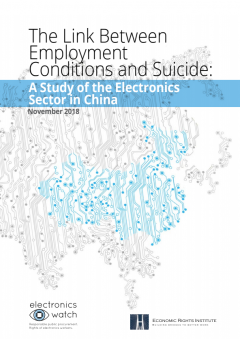 Note to the reader from report authors, Economic Rights Institute and Electronics Watch:
Note to the reader from report authors, Economic Rights Institute and Electronics Watch:
‘It is not our intention to suggest the problem of employee suicide is more or less serious in Chinese electronics versus other countries or industries. Such conclusions would require evidence beyond the findings represented here.
Furthermore, we wish to underline that every suicide is likely a response to multiple stresses. When responding to employee suicides, we should determine whether or not employment conditions contributed to the loss of life through a review of available evidence. Employers should not be held responsible for every suicide of their employees, and we should resist evidence to dramatize incidents of suicide to attack employers. We anonymise the results of this report to divert attention away from any single employer and to promote wider discussion of the issue.
We urge others to build on this study to consider how employment conditions might contribute to suicides. Positively, we believe this report is galvanizing new efforts to promote worker wellbeing only possible with the support of industry and government. We urge industry and government to work inclusively with civil society and independent experts to fully address their role and responsibilities to prevent suicides linked to employment conditions.’
The Rivers are Bleeding: British mining in Latin America
‘In the context of the boom and bust cycle of global commodity prices, over the last two decades, almost all the countries of the global South have seen intensified exploration and overexploitation of natural resources. Mega-mining, agribusiness, large-scale fishing, logging and oil and gas extraction have seen significant booms of activity.
In Latin America, mineral resources and fossil fuels have attracted huge foreign investments, resulting in the occupation of larger territories, the generation of copious quantities of waste and pollution, and the use of vast amounts of water and energy. The premise that the extraction of these resources leads to ‘development’ has shaped economic, social and environmental policy. Companies and states promote globalisation and exportoriented extraction as the only road to growth and in the process, maximise profits by outsourcing social and environmental costs.’
Living Under Risk: Copper, Information and Communication Technologies (ICT) and Human Rights in Chile
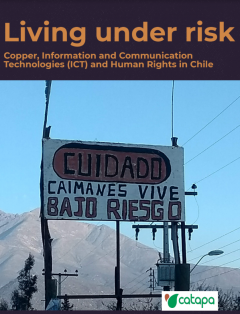 ‘Chile is currently the largest copper producer in the world, holding 29% of the world reserves of the red metal. Copper represents a crucial portion of the Chilean economy and the copper industry -as will be shown in this report- is highly influential in national politics. But the extent and intensity of copper extraction across Chile’s territory has precipitated negative impacts in the environment and on communities that resist extractivism.Through the analysis of a case study, this report unveils the adverse socio-environmental impacts of copper extraction and discusses the role of the company, the national government and international actors in addressing the consequences brought by the copper mining industry.’
‘Chile is currently the largest copper producer in the world, holding 29% of the world reserves of the red metal. Copper represents a crucial portion of the Chilean economy and the copper industry -as will be shown in this report- is highly influential in national politics. But the extent and intensity of copper extraction across Chile’s territory has precipitated negative impacts in the environment and on communities that resist extractivism.Through the analysis of a case study, this report unveils the adverse socio-environmental impacts of copper extraction and discusses the role of the company, the national government and international actors in addressing the consequences brought by the copper mining industry.’Assessing the social impacts of the preparatory and development phases at Lydian International’s Amulsar mine in Armenia through surveys of neighbouring communities
Biodiversity offsetting and other problems of the ESIA of Amulsar gold project in Armenia
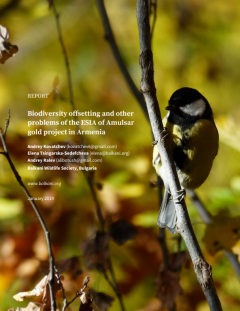 ‘The Amulsar Gold Project is located in the provinces of Vayots Dzor and Syunik in Southeast Armenia, 6 kilometers from the spa town of Jermuk. The project promoter “Lydian Armenia” has submitted an Environmental and Social Impact Assessment (ESIA) that was approved by the Ministry of Nature Protection (MNP) in mid 2016 and an operation permit was issued. Some Armenian experts argued that the approval of the project was done in violation of Republic of Armenia’s Law on Flora and Law of Fauna as it leads to reduction of the number of red-listed species and also in violation of the Law on Lake Sevan as the catchment basins of Arpa and Vorotan Rivers make up a part of Lake Sevan catchment basin.’
‘The Amulsar Gold Project is located in the provinces of Vayots Dzor and Syunik in Southeast Armenia, 6 kilometers from the spa town of Jermuk. The project promoter “Lydian Armenia” has submitted an Environmental and Social Impact Assessment (ESIA) that was approved by the Ministry of Nature Protection (MNP) in mid 2016 and an operation permit was issued. Some Armenian experts argued that the approval of the project was done in violation of Republic of Armenia’s Law on Flora and Law of Fauna as it leads to reduction of the number of red-listed species and also in violation of the Law on Lake Sevan as the catchment basins of Arpa and Vorotan Rivers make up a part of Lake Sevan catchment basin.’
Copper with a cost – Human rights and environmental risks in the minerals supply chains of ICT: A case study from Zambia
Report by Linda Scott Jakobsson for Swedwatch, published 6 May 2019.
‘Unsustainable extraction of copper, a mineral frequently used in ICT products, has caused environmental degradation and adverse impacts on human rights in local communities in Zambia, a new Swedwatch report finds. Zambian mining projects have often been linked to adverse human rights impacts, particularly for communities located near the mining sites. Copper is used in a vast number of information and communication (ICT) products, and as Zambia is one of the largest copper producers in the world, there is a clear possibility that Zambian copper is found in today’s global ICT supply chains.





Recent comments